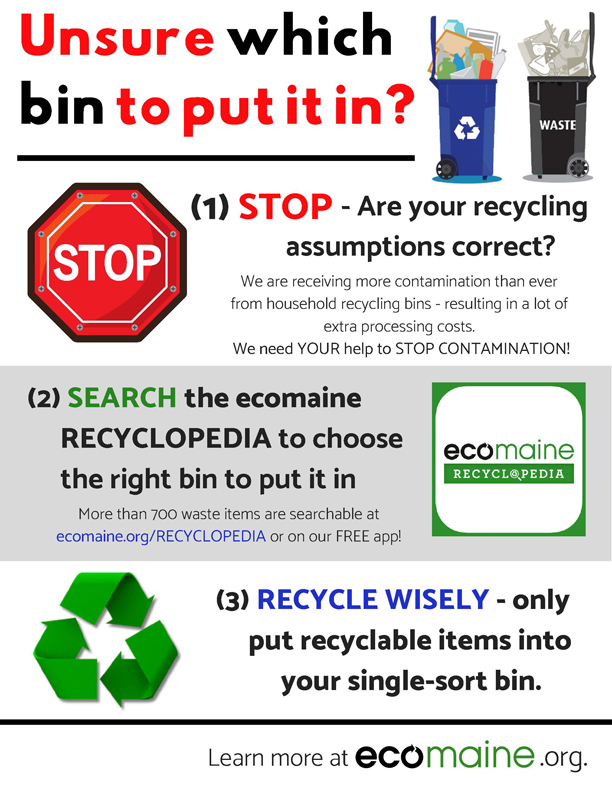Recycling: 'We need everyone to be more diligent about putting the correct items in the recycling bin'
Residents are being asked to be extra careful about keeping non-recyclables out of single-sort compactors and silver bullet bins.
In a letter to member communities May 2, 2018, ecomaine General Manager Kevin Roche called for towns and their residents to make sure only recyclable materials go in the recycling bin.
Markets for recyclables always fluctuate, but for the first time in 30 years they're actually exceeding trash-disposal costs, Roche said. The same ton of post-consumer paper that used to sell for $100 is now costing $60 to be hauled away.
And, "with buyers not paying anything (and, in fact, charging us to take the paper), they're also much less tolerant of any contamination," said Roche, also chief executive officer of the non-profit, municipally owned waste-management company that includes Cape Elizabeth.
"Any contamination is problematic and makes the current market situation even more challenging."
Robert Malley, Cape Elizabeth's director of Public Works, said he is not aware of Cape Elizabeth recycling containing a great deal of contaminants, although some does wind up in the unsupervised "silver bullet" bins behind Town Hall. The greatest offender is probably plastic bags containing recyclables, and he reminded residents that the bags should be emptied and reused, or brought to a retailer for recycling.
Styrofoam is the most questioned item, Malley said. The answer is "no."
"Now the mindset is, if there is any doubt, don't put it in," Malley said.
Ecomaine itself is combatting contaminants by quadrupling staff on paper-sorting lines, slowing down the lines, and researching new sorting-screen technology. Bundles containing more than 5 percent contaminants will be charged a $40-per-ton fee, and those exceeding 10 percent will be charged the same $70.50 fee charged for a ton of solid waste.
The fees are ongoing ecomaine policy, the letter says, but town officials were unaware of them and have not budgeted for them. Lisa Wolff, ecomaine's communications manager, said the policy is not new, but new contamination standards will mean more routine inspections of loads being delivered to ecomaine. "So, the exercising of the policy may be more rigorous than in the past," Wolff said. She said the stepped-up inspections are just beginning and had no information on how much non-recyclable contamination is coming from Cape Elizabeth.
Ecomaine's website reports that 1,104.77 tons of recycling was processed from Cape Elizabeth in fiscal year 2017, for a recycling rate of 34 percent.
Although the town has yet to incur a fee for contaminated recyclables, Town Manager Matthew Sturgis called on residents to keep non-recyclable items, even trash, out of the bin. "If you recycle, clean it out a little bit. You will be helping everyone," he said.
Roche, in his letter, attributed declining values of used paper to a glut of supply, strict policies against contamination worldwide, and the disappearance of once dominant newsprint from recycling bins. "With little to no newspapers, markets have dried up," he said.
"Historically, markets have traditionally experienced a cyclical pattern, but this glut has continued for an extended period," Roche said. The market may swing back again in time, but for now, "we need everyone, including public works staff, transfer station operators, haulers and the public at large, to be more diligent about putting the correct items in their recycling bins."
If you have a question about whether or not an item is recyclable please use ecomaine's handy "Recyclopedia."
